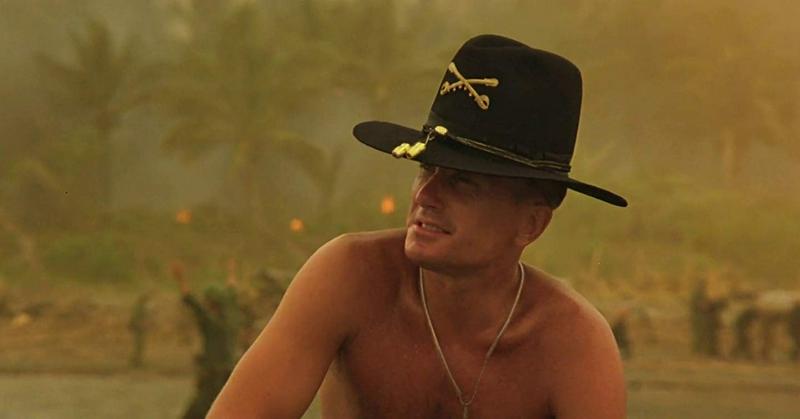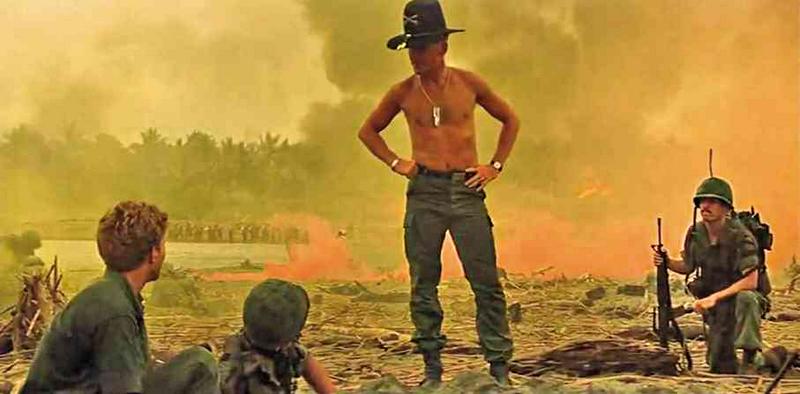'I Love The Smell Of Napalm In The Morning:' The 'Apocalypse Now' Line, Explained
By | January 24, 2019

"I love the smell of napalm in the morning" from Apocalypse Now (1979) is one of those perfect movie quotes that applies to us all -- even though most of us weren't in Vietnam and have never smelled napalm in the morning. As delivered entirely straight-faced by Lieutenant Colonel Kilgore (Robert Duvall), in director Francis Ford Coppola's war epic, the line expresses many things at once. There's a morbid optimism to it, an enthusiasm for a hellish predicament, a complete command of the details of a situation with a complete lack of interest in its life-or-death gravity. Kilgore fondly speaks of napalm as many of us would of our morning coffee or frying bacon.
But Kilgore, as protagonist and narrator Captain Willard (Martin Sheen) observes, has that x-factor that makes some men thrive in the midst of the chaos of Vietnam. "He was just one of those guys with that weird light around him," Willard tells us. "He just knew he wasn't gonna get so much as a scratch here." While Kilgore's fondness for the death-dealing combustible shocks us, his bulletproof competence and confidence inspires at least a bit of envy.
That's why we say it when we wake up with chaos swarming all around, a day of hell laid out before us. We want to get the day's job done without sweating the existential threats crashing all around us -- we summon our own inner Kilgore: "I love the smell of napalm in the morning. ... It smells like victory."
In the 40 years since the release of Apocalypse Now, "I love the smell of napalm in the morning" has taken on a life of its own. It's been misquoted, used in cartoons, and even repurposed to fit into films by guys like Kevin Smith. At this point “napalm” is inescapable.
If you love to quote movies like Apocalypse Now, Jaws, and Dirty Harry, that’s because they were written with the stylistic flourish of John Milius. His screenwriting career has taken him to the Wild West with Jeremiah Johnson, and to the mythical Hyborean Age with Conan the Barbarian, but he most famously brought the horrors of Vietnam to the American people in Apocalypse Now.
Milius isn’t pretentious about the line, and in an interview with CNN he admitted that it just popped into his head one day. Milius said:
I just wrote it -- it just came up. That's what happens. People love to think that all this stuff happens when you write a famous line -- that you really thought about it a lot.
As much as cinephiles love that line, Milius takes greater pride in another famous statement Kilgore says later in the scene: “Charlie don’t surf.”
You're Probably Getting The Quote Wrong

If you’re one of the many people who loves to smell napalm in the morning, mostly because it smells like victory, then you’re also one of the many people saying the line all wrong. The actual quote is much longer than people think it is. Robert Duvall as Lieutenant Colonel Kilgore doesn’t simply say, “I love the smell of napalm in the morning, it smells like victory.”
His actual quote is much more intense, and it nods to the horrors of war that the character faces, and the way they’ve warped his thoughts. Additionally, the racial slur indicates a view that the enemy is subhuman, which prevents remorse over killing them. Kilgore says:
I love the smell of napalm in the morning. You know, one time we had a hill bombed for 12 hours. When it was all over, I walked up. We didn’t find one of ’em, not one stinkin' dink body. The smell, you know that gasoline smell, the whole hill. Smelled like victory.
What Is Napalm, Anyway?

You've said the word a thousand times, you've heard Robert Duvall bark it out in Apocalypse Now, but what exactly is napalm? Originally developed at Harvard in 1942, napalm was manufactured for the air missions in World War II, although armies around the world were using lesser versions of napalm as early as World War I. The incendiary substance contains a gel that gives the mixture a tacky texture that sticks to its targets, burning whatever it touches at the constant heat of 5,000 degrees Fahrenheit and for longer durations than that of your average explosive device.
The appeal of using napalm is the way that it destroys everything it touches regardless of whether it's being dropped from a plane or fired from a flamethrower. Either way, napalm is perfect for long-distance annihilation.
When deployed from a plane, napalm bombs suck the oxygen out of wherever they explode, turning the air to at least 20 percent carbon monoxide. It’s likely that if you were actually smelling more than a slight whiff of napalm, you wouldn’t be around long enough to boast about your preferred time of day in which its bouquet hit you.
The Quote Is Used In So Many Movies And TV Shows

Even if you’ve never seen Apocalypse Now there’s a good chance that you’ve heard the famous napalm quote in another film or television show. Heck, there’s a pretty good chance that your kids have even heard the quote in a Saturday morning cartoon. The quote is so ubiquitous in the culture that it’s wriggled its way into movies like Mallrats, Alvin and the Chipmunks: The Squeakquel, and DodgeBall: A True Underdog Story.
On top of that, if you’ve watched an episode of The A-Team, House, or MythBusthers lately then you’ve definitely heard someone rip off Kilgore’s immortal line. That just goes to show that if you really touch people with your work it stays around forever -- but maybe not in the ways you think it does.
Duvall’s Quote Inspired Every Blockbuster That Followed

Writing for the Guardian, Anne Bilson theorizes that Kilgore’s immortal napalm line and the rest of the extremely quotable Apocalypse Now inspired the screenwriters and filmmakers that followed to jam pack their movies full of instantly memorable dialogue. With lines like "I love the smell of napalm in the morning,” and "Terminate … with extreme prejudice" (to say nothing of the nuttiness uttered by Dennis Hopper and Marlon Brando) it’s impossible not to be inspired to recreate the sensation of flipping a switch in a filmgoer's head.
Truly Great Films Need That One Distinctive Line

For better or for worse, Apocalypse Now inspired a generation of filmmakers to create witty, easily quotable expressions of badassery -- without that line, we might not have "Go ahead, make my day" (Sudden Impact, 1983), "You can't handle the truth!" (A Few Good Men, 1992) or "Show me the money!" (Jerry Maguire, 1996). Kilgore's love of napalm may just have changed cinema forever.
